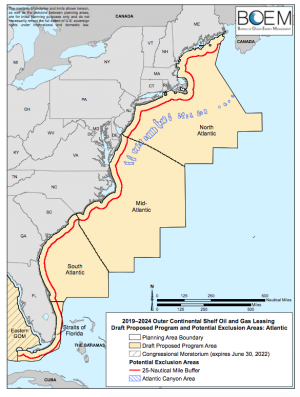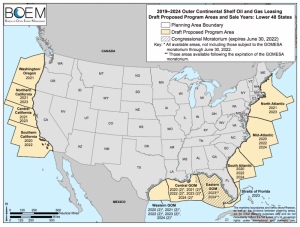RFP issued to study local impacts from ocean oil spill

With the proposed Skipjack Wind Farm off Delaware’s ocean coast, turbines are getting a lot of attention. However, not too long ago, it was the potential for offshore oil drilling in those same federal waters that drew the near-unanimous ire of the state’s coastal towns.
Elected officials, residents, property owners and business owners from Lewes to Fenwick spoke with such clarity on the issue the General Assembly passed a bill that prohibits drilling for oil and natural gas in Delaware's Coastal Zone. The bill was signed into law in September 2018 by Gov. John Carney.
Ultimately, the law protects only the first three miles of ocean off the state’s coast, which means commercial offshore oil production is still possible at some point in the future. With that in mind, Delaware Department of Natural Resources and Environmental Control issued a request for proposals Nov. 1 to obtain information on oil spills and their economic impact on the state. According to the RFP, the study is intended to obtain the data needed to improve Delaware’s resiliency should an oil spill occur.
The 61-page document says this project has two phases – to model where oil would go in Delaware under varied offshore spill scenarios and to estimate the economic impacts of an offshore oil spill.
For Phase I, the model would be expected to show multiple oil spill scenarios, including coastal areas affected, habitats disturbed, and duration of the event. The model would be expected to simulate oil spills at three offshore locations – Delaware, Maryland and Virginia.
At each of the three locations, three surface oil spill volumes will be simulated to represent a low-, medium-, and high-volume oil release scenario. In addition to a surface-based oil spill, at each location, a subsea well-blowout event, similar to the Deepwater Horizon event in the Gulf of Mexico, will also be simulated.
The RFP says these three general locations were selected in recognition that oil drilling anywhere in the Mid-Atlantic offshore environment could affect Delaware’s habitats and coastal communities.
Phase II of the study calls for an evaluation of Delaware’s coastal communities to assess anticipated spill-related losses in fees, taxes and other revenues to the state and individual towns. This evaluation must include results from the three spill volumes at all three spill locations, the subsea scenario and at different times of the year.
There will also be an estimate of potential reduction in beach use, recreational boating, and other coastal recreational and commercial activities. The RFP also calls for an estimate on indirect economic effects in coastal recreation – hotel stays, restaurant expenditures and other recreation-related purchases.
The deadline to respond to the RFP is Thursday, Dec. 5. The contract will be awarded within 90 days of bid opening. The National Oceanic and Atmospheric Administration awarded the state $200,000 for this project.
Chris Flood has been working for the Cape Gazette since early 2014. He currently covers Rehoboth Beach and Henlopen Acres, but has also covered Dewey Beach and the state government. He covers environmental stories, business stories and random stories on subjects he finds interesting, and he also writes a column called Choppin’ Wood that runs every other week. He’s a graduate of the University of Maine and the Landing School of Boat Building & Design.























































